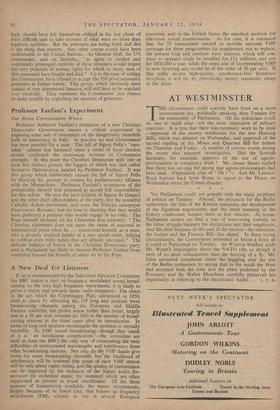AT WESTMINSTER
THE Government could scarcely have fixed on a more inconvenient day, politically speaking, than Tuesday for the reassembly of Parliament. All the politicians could do was to mark time—not the most impressive of military exercises. It is true that there was necessary work to be done —approval of the money resolutions for the two Housing Bills, which was debated on Wednesday, and approval of the second reading of the Mines and Quarries Bill for debate on Thursday and Friday. A number of curious events during the recess also required investigation. Did the Scottish Secretary, for example, approve of the use of agents- provocateurs in conspiracy trials '? Mr. James Stuart replied that there was no case for saying that agents-provocateurs had been used. (Opposition. cries of " Oh ! ".) And Mr. Lennox- Boyd hurried back from Rome to report to the House on Wednesday about the Comet disaster.
* Yet Parliament. could not grapple with the main problems of politics on Tuesday. Abroad, the prospects for the Berlin conference, the fate of the Korean prisoners, the development of the Egyptian negotiations, and the inn& meaning of the Sydney conference, remain more or less obscure. At home, Parliament cannot yet find a way of intervening usefully in the bitter struggle between the electricians and their employers. And the chief business of this part of the session—the estimates, the budget and the Finance Bill—lies ahead. In these trying circumstances, the Government presented as brave a front as it could to Parliament on Tuesday. Sir. Winston brushed aside Mr. Wyatt's importtinity about the NATO rifle as though it were of no more consequence than the buzzing of a fly; Mr. Eden answered complaints about the haggling over the site of the Berlin conference by saying that in the result the West had accepted both the time and the place preferred by the Russians; and Sir Walter Monckton carefully preserved his impartiality in referring to the electricians' battle. J. F. B.


































 Previous page
Previous page